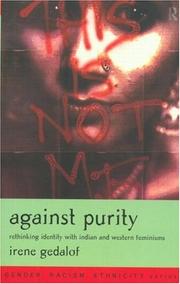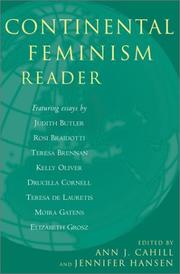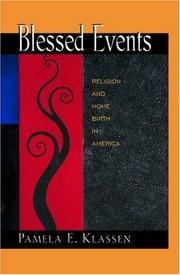| Listing 1 - 10 of 11 | << page >> |
Sort by
|
Book
ISBN: 9781472573353 9781474236720 1474236723 1472573358 Year: 2014 Publisher: London : Bloomsbury Academic,
Abstract | Keywords | Export | Availability | Bookmark
 Loading...
Loading...Choose an application
- Reference Manager
- EndNote
- RefWorks (Direct export to RefWorks)
Philosophie. --- Science politique --- Théorie féministe. --- Philosophie. --- Braidotti, Rosi.

ISBN: 0415215870 Year: 1999 Publisher: London Routledge
Abstract | Keywords | Export | Availability | Bookmark
 Loading...
Loading...Choose an application
- Reference Manager
- EndNote
- RefWorks (Direct export to RefWorks)
Feminism --- Feminist theory --- Women --- Identity --- Developmental psychology --- Sociology of the family. Sociology of sexuality --- Butler, Judith --- Irigaray, Luce --- India --- Braidotti, Rosi --- Haraway, Donna Jeanne --- Theory --- Whiteness --- Book
Book
Abstract | Keywords | Export | Availability | Bookmark
 Loading...
Loading...Choose an application
- Reference Manager
- EndNote
- RefWorks (Direct export to RefWorks)
Philosophy --- Sociology of the family. Sociology of sexuality --- Demography --- Higher education --- Personnel management --- DVD --- Feminism --- Professors --- Interviews --- Career --- Migration --- Biographical details --- Braidotti, Rosi --- Netherlands

ISBN: 0742523098 Year: 2003 Publisher: Lanham Rowman & Littlefield
Abstract | Keywords | Export | Availability | Bookmark
 Loading...
Loading...Choose an application
- Reference Manager
- EndNote
- RefWorks (Direct export to RefWorks)
Gender identity. --- Sex differences (Psychology). --- Sociology of the family. Sociology of sexuality --- Butler, Judith --- Lauretis, de, Teresa --- Grosz, Elisabeth --- Brennan, Teresa --- Braidotti, Rosi --- Gatens, Moira --- Cornell, Drucilla --- Oliver, Kelly --- Feminism --- Theory --- Book --- Courses
Book
ISBN: 9781607852810 Year: 2012 Publisher: Ann Arbor, Michigan : Open Humanities Press, an imprint of Michigan Publishing, University of Michigan Library
Abstract | Keywords | Export | Availability | Bookmark
 Loading...
Loading...Choose an application
- Reference Manager
- EndNote
- RefWorks (Direct export to RefWorks)
Political philosophy. Social philosophy --- filosofie --- kunsttheorie --- nieuw materialisme --- neomaterialisme --- new materialism --- neomaterialism --- materialisme --- Braidotti Rosi --- DeLanda Manuel --- Barad Karen --- Meillassoux Quentin --- 1 --- 7.01 --- E-books --- Materialism. --- Philosophy, Modern
Book
ISBN: 9780745641577 0745641571 074564158X 9780745641584 Year: 2013 Publisher: Cambridge Polity Press
Abstract | Keywords | Export | Availability | Bookmark
 Loading...
Loading...Choose an application
- Reference Manager
- EndNote
- RefWorks (Direct export to RefWorks)
The Posthuman offers both an introduction and major contribution to contemporary debates on the posthuman. Digital 'second life', genetically modified food, advanced prosthetics, robotics and reproductive technologies are familiar facets of our globally linked and technologically mediated societies. This has blurred the traditional distinction between the human and its others, exposing the non-naturalistic structure of the human. The Posthuman starts by exploring the extent to which a post-humanist move displaces the traditional humanistic unity of the subject. Rather than perceiving this situation as a loss of cognitive and moral self-mastery, Braidotti argues that the posthuman helps us make sense of our flexible and multiple identities. Braidotti then analyzes the escalating effects of post-anthropocentric thought, which encompass not only other species, but also the sustainability of our planet as a whole. Because contemporary market economies profit from the control and commodification of all that lives, they result in hybridization, erasing categorical distinctions between the human and other species, seeds, plants, animals and bacteria. These dislocations induced by globalized cultures and economies enable a critique of anthropocentrism, but how reliable are they as indicators of a sustainable future? The Posthuman concludes by considering the implications of these shifts for the institutional practice of the humanities. Braidotti outlines new forms of cosmopolitan neo-humanism that emerge from the spectrum of post-colonial and race studies, as well as gender analysis and environmentalism. The challenge of the posthuman condition consists in seizing the opportunities for new social bonding and community building, while pursuing sustainability and empowerment.
Persons. --- Philosophical anthropology. --- Biotechnology. --- Personnes --- posthumanisme --- Human beings --- Philosophical anthropology --- 130.2 --- antropologie --- cultuurfilosofie --- filosofie --- identiteit --- Anthropology, Philosophical --- Man (Philosophy) --- Civilization --- Life --- Ontology --- Humanism --- Persons --- Philosophy of mind --- Homo sapiens --- Human race --- Humanity (Human beings) --- Humankind --- Humans --- Man --- Mankind --- People --- Hominids --- Philosophy --- #SBIB:316.7C120 --- #SBIB:1H30 --- 316.323.9 --- 316.323.9 Postmoderne maatschappij. Sociologie van het postmodernisme --- Postmoderne maatschappij. Sociologie van het postmodernisme --- Cultuursociologie: algemene en theoretische werken --- Filosofie van de mens, wijsgerige antropologie --- Anthropologie philosophique --- Biotechnologie --- Human beings. --- Corps humain --- Philosophie de l'homme --- Technologie --- Homme --- Philosophie. --- Aspect social --- Effets des innovations --- Innovations --- Rosa Braidotti --- Rosi Braidotti --- #SBIB:39A3 --- Antropologie: geschiedenis, theorie, wetenschap (incl. grondleggers van de antropologie als wetenschap) --- Corps humain - Philosophie. --- Technologie - Aspect social --- Homme - Effets des innovations --- Corps humain - Innovations --- Feminism --- Gender --- Climate --- Technology --- Science --- Book
Book
ISBN: 9788898727629 9788836651375 8836651372 Year: 2022 Publisher: Venice La Biennale di Venezia
Abstract | Keywords | Export | Availability | Bookmark
 Loading...
Loading...Choose an application
- Reference Manager
- EndNote
- RefWorks (Direct export to RefWorks)
Blloshmi, Lumturi ; Heller, Mónica ; Arutiunian, Andrius ; Fusinato, Marco ; Knebl, Jakob Lena & Scheirl, Ashley Hans ; Akhundova, Fidan ; Baghirzade, Agdes ; Infinity ; Khankishiyeva, Sabiha ; Novruzova, Fidan (Fidam Kim) ; Saadatkhan, Ramina ; Zhuk (Israfilova, Narmin) ; enz.
Art --- Art, Modern --- kunst --- magie --- Braidotti Rosi --- gender studies --- feminisme --- surrealisme --- 7.039 --- lichamelijkheid --- Biennale di Venezia --- Biënnale van Venetië --- eenentwintigste eeuw --- 705.9 --- conceptuele kunst --- kunst; algemeen ; beeldende kunst; algemeen ; 21e eeuw --- Biennale di Venezia. --- Bienal de Venecia --- Bienal de Veneza --- Bienal Internacional de Arte --- Bienal Internacional de Venecia --- Biʼenaleh be-Ṿenetsyah --- Biennale d'arte --- Biennale de Venise --- Biennale di Arte di Venezia --- Biennale internationale d'art de Venise --- Biennale internazionale d'arte Venezia --- Biennale of Venice --- Biennale Venedig (Exhibition) --- Biennale veneziana --- Biennle Arte --- Ente autonomo la Biennale di Venezia --- Ente della Biennale --- Esposizione biennale internazionale d'arte --- Esposizione internazionale d'arte --- International Art Biennale --- International Art Exhibition --- International Biennial Exhibition of Art --- International Exhibition of Art --- International Venice Biennale --- Velencei Biennálé --- Venice Biennale --- Venice Biennial --- Weinisi shuang nian zhan --- ביאנלה בוונציה --- 威尼斯雙年展 --- Exhibitions --- Biennials (Art fairs) --- art [discipline] --- technology [general associated concept] --- Homo sapiens [species] --- fauna --- flora [plants] --- metamorfose --- bodies [animal components]

ISBN: 0691087989 1400828511 0691087970 Year: 2001 Publisher: Princeton Princeton university press
Abstract | Keywords | Export | Availability | Bookmark
 Loading...
Loading...Choose an application
- Reference Manager
- EndNote
- RefWorks (Direct export to RefWorks)
Blessed Events explores how women who give birth at home use religion to make sense of their births and in turn draw on their birthing experiences to bring meaning to their lives and families. Pamela Klassen introduces a surprisingly diverse group of women, in their own words, while also setting their birth stories within wider social, political, and economic contexts. In doing so, she emerges with a study that disrupts conventional views of both childbirth and religion by blurring assumed divisions between conservative and feminist women and by taking childbirth seriously as a religious act.Most American women who have a choice give birth in a hospital and request pain medication. Yet enough women choose and advocate unmedicated home birth--and do so for carefully articulated reasons, social resistance among them--to constitute a movement. Klassen investigates why women whose religious affiliations range from Old Order Amish to Reform Judaism to goddess-centered spirituality defy majority opinion, the medical establishment, and sometimes the law to have their babies at home. In considering their interpretations--including their critiques of the dominant medical model of childbirth and their views on labor pain--she examines the kinds of agency afforded to or denied women as they derive religious meanings from childbirth. Throughout, she identifies tensions and affinities between feminist and traditionalist appraisals of the symbolic meaning of birth and the power of women.What does home birth--a woman-centered movement working to return birth to women's control--mean in practice for women's gender and religious identities? Is this supreme valuing of procreation and motherhood constraining, or does it open up new realms of cultural and social power for women? By asking these questions while remaining cognizant of religion's significance, Blessed Events challenges both feminist and traditionalist accounts of childbearing while broadening our understanding of how religion is ''lived'' in contemporary America.
Childbirth at home --- Religious aspects --- Religious aspects. --- United States --- Albanese, Catherine. --- Auletta, Valerie. --- Bachelard, Gaston. --- Barry, Kathleen. --- Bell, Catherine. --- Birth Gazette. --- Braidotti, Rosi. --- Bynum, Caroline Walker. --- Christ, Carol. --- Copeland, Kenneth. --- Cyborg Manifesto (Haraway). --- Day, Dorothy. --- Dickinson, Emily. --- Donato, Suzanne. --- Edwards, Elizabeth. --- Flaherty, Sara. --- Foucault, Michel. --- Gallagher, Janet. --- Griffith, Marie. --- Hechtel, Eva. --- Home Birth (Kitzinger). --- Hostetler, Tina. --- Immaculate Deception (Arms). --- Islam. --- Jay, Nancy. --- Jewish maternity hospitals. --- Jones, Linda Carson. --- Katz, Joanna. --- Kaufert, Patricia. --- Kleinman, Arthur. --- Lazarus, Ellen. --- MacCormack, Carol. --- Mather, Cotton. --- Moran, Marilyn. --- Norris, Kathleen. --- Olds, Sharon. --- Orsi, Robert. --- Park, Caroline. --- Pollinger, Annette. --- Porterfield, Amanda. --- Scarry, Elaine. --- Smith, Bonnie. --- Taylor, Simone. --- Thatcher, Elaine. --- abortion. --- alternative birth movement. --- fetus. --- habitus. --- hooks, bell. --- procreation stories. --- racism. --- sacred. --- Religion and culture
Book
Year: 2022 Publisher: Basel MDPI - Multidisciplinary Digital Publishing Institute
Abstract | Keywords | Export | Availability | Bookmark
 Loading...
Loading...Choose an application
- Reference Manager
- EndNote
- RefWorks (Direct export to RefWorks)
The essays in this collection aim to waken contemporary discussions of ethos(and of rhetoric generally) from their Western, classical-Aristotelian slumbers.Western rhetoric was never univocal in its theory or practice of ethos: the essaysin this collection provide proof of this. The contributors aimed to shake rhetoricout of its Eurocentrism: the traditions of Africa, the Middle East, and Asia sustaintheir own models of ethos and lead us to reconsider rhetoric in its richvariety—what ethos was, is, and will become. This collection is groundbreakingin its attempt to outline the diversity of argument, trust, and authority beyonda singular, dominant perspective.This collection offers readers a choice of itineraries: thematic, geographic, andhistorical. Essays may be read individually or cumulatively, as exercises incomparative rhetoric. In taking a world perspective, Histories of Ethos willprove a seminal discussion. Its comparative approach will help readers appreciatethe commonalities and the distinctions in competing cultural-discursivepractices—in what brings us together and what drives us apart as communities.Additionally, it is the editors’ hope that, out of this historical, multiculturaldialogue, some new perspectives on ethos may come forward to broaden ourdiscussion and reach of understanding.
Philosophy --- ethos --- selfhood --- identity --- authenticity --- authority --- persona --- positionality --- postmodernism --- haunt --- iatrology --- trust --- storytelling --- Archer --- Aristotle --- Bourdieu --- Corder --- Foucault --- Geertz --- Giddens --- Gusdorf --- Heidegger --- African American literature --- slave narratives --- Phillis Wheatley --- Martin Luther King --- Malcolm X --- W.E.B. Du Bois --- Booker T. Washington --- Oglala Lakota --- wound --- ecology --- ecological --- Wounded Knee --- American Indian --- cultural wound --- hip hop --- black aesthetics --- New York --- flow --- layering --- rupture --- productive consumption --- hype --- entrepreneurship --- politics --- counter-knowledge --- class --- social class --- working class --- habitus --- social capital --- GLBT/LGBTQ --- queer --- normativity --- homonormativity --- polemic --- futurity --- undecidability --- re/disorientation --- legitimacy --- rhetorical agency --- outness --- Islamic ethos --- nonwestern rhetorics --- Islamophobia --- The Qur’an --- Sunnah --- Ijtihad --- Islamic State --- Muslim community (Ummah) --- Caliphate --- disability --- invention --- rehabilitation --- accessibility --- inclusion --- intersectionality --- cross-disability identity --- actant --- cyborg --- COVID-19 --- deep ecology --- pandemic --- posthumanism --- skeptron --- technoculture --- Braidotti --- Haraway --- Latour --- African slave trade --- trauma --- visual rhetorics --- wolof language --- Dakar --- Door of No Return --- Gorée Island --- House of Slaves --- Senegal --- contemporary ethos --- Ghana --- dialogic --- heteroglossia --- postmodern discourses --- proverbs --- sexual identity --- sexual presentation --- conservative values --- tradition --- Chinese ethos --- rhetoric --- early Chinese rhetoric --- Heaven --- cultural heritage --- ethos --- selfhood --- identity --- authenticity --- authority --- persona --- positionality --- postmodernism --- haunt --- iatrology --- trust --- storytelling --- Archer --- Aristotle --- Bourdieu --- Corder --- Foucault --- Geertz --- Giddens --- Gusdorf --- Heidegger --- African American literature --- slave narratives --- Phillis Wheatley --- Martin Luther King --- Malcolm X --- W.E.B. Du Bois --- Booker T. Washington --- Oglala Lakota --- wound --- ecology --- ecological --- Wounded Knee --- American Indian --- cultural wound --- hip hop --- black aesthetics --- New York --- flow --- layering --- rupture --- productive consumption --- hype --- entrepreneurship --- politics --- counter-knowledge --- class --- social class --- working class --- habitus --- social capital --- GLBT/LGBTQ --- queer --- normativity --- homonormativity --- polemic --- futurity --- undecidability --- re/disorientation --- legitimacy --- rhetorical agency --- outness --- Islamic ethos --- nonwestern rhetorics --- Islamophobia --- The Qur’an --- Sunnah --- Ijtihad --- Islamic State --- Muslim community (Ummah) --- Caliphate --- disability --- invention --- rehabilitation --- accessibility --- inclusion --- intersectionality --- cross-disability identity --- actant --- cyborg --- COVID-19 --- deep ecology --- pandemic --- posthumanism --- skeptron --- technoculture --- Braidotti --- Haraway --- Latour --- African slave trade --- trauma --- visual rhetorics --- wolof language --- Dakar --- Door of No Return --- Gorée Island --- House of Slaves --- Senegal --- contemporary ethos --- Ghana --- dialogic --- heteroglossia --- postmodern discourses --- proverbs --- sexual identity --- sexual presentation --- conservative values --- tradition --- Chinese ethos --- rhetoric --- early Chinese rhetoric --- Heaven --- cultural heritage
Book
Year: 2022 Publisher: Basel MDPI - Multidisciplinary Digital Publishing Institute
Abstract | Keywords | Export | Availability | Bookmark
 Loading...
Loading...Choose an application
- Reference Manager
- EndNote
- RefWorks (Direct export to RefWorks)
The essays in this collection aim to waken contemporary discussions of ethos(and of rhetoric generally) from their Western, classical-Aristotelian slumbers.Western rhetoric was never univocal in its theory or practice of ethos: the essaysin this collection provide proof of this. The contributors aimed to shake rhetoricout of its Eurocentrism: the traditions of Africa, the Middle East, and Asia sustaintheir own models of ethos and lead us to reconsider rhetoric in its richvariety—what ethos was, is, and will become. This collection is groundbreakingin its attempt to outline the diversity of argument, trust, and authority beyonda singular, dominant perspective.This collection offers readers a choice of itineraries: thematic, geographic, andhistorical. Essays may be read individually or cumulatively, as exercises incomparative rhetoric. In taking a world perspective, Histories of Ethos willprove a seminal discussion. Its comparative approach will help readers appreciatethe commonalities and the distinctions in competing cultural-discursivepractices—in what brings us together and what drives us apart as communities.Additionally, it is the editors’ hope that, out of this historical, multiculturaldialogue, some new perspectives on ethos may come forward to broaden ourdiscussion and reach of understanding.
Philosophy --- ethos --- selfhood --- identity --- authenticity --- authority --- persona --- positionality --- postmodernism --- haunt --- iatrology --- trust --- storytelling --- Archer --- Aristotle --- Bourdieu --- Corder --- Foucault --- Geertz --- Giddens --- Gusdorf --- Heidegger --- African American literature --- slave narratives --- Phillis Wheatley --- Martin Luther King --- Malcolm X --- W.E.B. Du Bois --- Booker T. Washington --- Oglala Lakota --- wound --- ecology --- ecological --- Wounded Knee --- American Indian --- cultural wound --- hip hop --- black aesthetics --- New York --- flow --- layering --- rupture --- productive consumption --- hype --- entrepreneurship --- politics --- counter-knowledge --- class --- social class --- working class --- habitus --- social capital --- GLBT/LGBTQ --- queer --- normativity --- homonormativity --- polemic --- futurity --- undecidability --- re/disorientation --- legitimacy --- rhetorical agency --- outness --- Islamic ethos --- nonwestern rhetorics --- Islamophobia --- The Qur’an --- Sunnah --- Ijtihad --- Islamic State --- Muslim community (Ummah) --- Caliphate --- disability --- invention --- rehabilitation --- accessibility --- inclusion --- intersectionality --- cross-disability identity --- actant --- cyborg --- COVID-19 --- deep ecology --- pandemic --- posthumanism --- skeptron --- technoculture --- Braidotti --- Haraway --- Latour --- African slave trade --- trauma --- visual rhetorics --- wolof language --- Dakar --- Door of No Return --- Gorée Island --- House of Slaves --- Senegal --- contemporary ethos --- Ghana --- dialogic --- heteroglossia --- postmodern discourses --- proverbs --- sexual identity --- sexual presentation --- conservative values --- tradition --- Chinese ethos --- rhetoric --- early Chinese rhetoric --- Heaven --- cultural heritage
| Listing 1 - 10 of 11 | << page >> |
Sort by
|

 Search
Search Feedback
Feedback About UniCat
About UniCat  Help
Help News
News